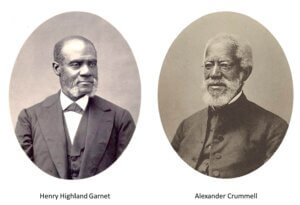The Abolitionists of Noyes Academy Explored at NHTI Library Event
 In 1835, streams of oxen in Canaan, N.H., pulled a school off its foundation and dragged it to where it would be burned to the ground by a mob of angry, drunken men outraged by the presence of black students.
In 1835, streams of oxen in Canaan, N.H., pulled a school off its foundation and dragged it to where it would be burned to the ground by a mob of angry, drunken men outraged by the presence of black students.
As historian Dan Billin tells it, one of the students described the incident as such: “A few black students with books in their hands set the Granite State on fire.” This school was Noyes Academy, one of the first integrated, co-educational preparatory schools in the United States, founded by abolitionists.
On Feb. 24, Billin presented “The Abolitionists of Noyes Academy” as part of the Wings of Knowledge series at NHTI’s Learning Commons Library. (For information on the next event, A Walk Back in Time — The Secrets of Cellar Holes, visit here.)
By the early 1830s, the abolitionist movement had become active, distributing thousands of anti-slavery pamphlets to southern states. Possession of these pamphlets could lead to arrest or mob violence.
“Especially if you were black and you were an abolitionist, you were in danger of being lynched,” Billin said. “It can be difficult to comprehend how common this type of activity was and how widespread the spirit of violence and lawlessness was.”
Though Billin grew up in New Hampshire and worked in the state as a reporter for many years, he says he only belatedly learned of Noyes Academy. It’s a story he now tells in depth, accompanied by extraordinary archival materials, including photos of a bill of sale for an enslaved woman named Diana Williams and the house where several black students barricaded themselves against the men who had destroyed their school.
The story of Noyes Academy is harrowing but also heroic, involving three black students and friends who would become influential anti-slavery activists: Thomas Sipkins Sidney, Alexander Crummell, and Henry Highland Garnet.
“These were astonishing young men. In their early teens, they had an amazing sense of themselves,” Billin said. “The three friends formed a society that would get together and plot what they might do to advance the cause of black freedom.”
Sidney drafted a resolution passed by their society, in which they vowed they would not celebrate the Fourth of July until slavery was abolished, they would get an education, and, after they were educated, they would go south and lead a slave uprising to end slavery. Garnet was invited in 1865 to deliver a sermon in the House of Representatives after the passage of the 13th Amendment abolishing slavery.
“This was extraordinary because no black man had ever spoken in the nation’s Capitol before,”
Billin said. “You have to remember that until just before this happened he was still by law, the laws passed in this chamber, the property of another man.
“He talked about his own experience as a slave, how the first sound he remembered was the clanking of his mother’s chains. He demanded more than just the abolition of slavery. He said, ‘We need enfranchisement and we need total equality under the law.’”
Crummell went on to describe emancipation as “not just a gift from white people but a concession to the demands of black people.”
Crummell, the son of a slave kidnapped from Africa, entered the episcopal ministry, but discrimination thwarted his attempts to establish a church. He would eventually travel to England, which had abolished the slave trade, to raise money for a church he founded in New York City. When Crummell died, his passing was noted in papers across the country, Billin said.
“W. E. B. Dubois in a eulogy noted him as one of the towering Black figures of his time.”
– – –
The Wings of Knowledge speaker series, hosted by the library, was launched in 2001 in conjunction with the opening of the Learning Commons building. This program facilitates close interaction between the College and its surrounding communities. The cultural events promoted by Wings of Knowledge are free and open to the public. They encourage us to explore ideas in the humanities and social sciences and help the College fulfill its mission to enrich the intellectual lives of our learning and geographic communities by promoting life-long learning and fostering robust relationships between our institution and members of our city, county, state, and beyond.
For more information and to see upcoming Wings of Knowledge Events, visit our Library page and Events page.

